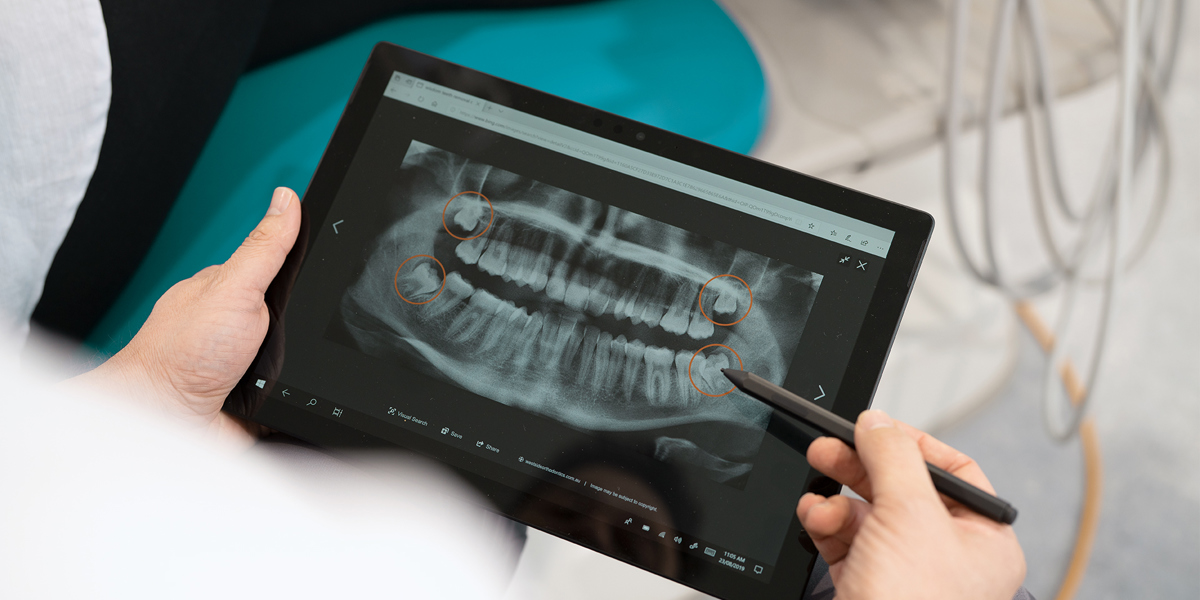
Wisdom teeth are unpredictable and the pain can be very uncomfortable. Unfortunately, they don't make us wise and in most cases need to be removed.
Most people experience wisdom teeth discomfort from their late teens until their mid-twenties. Wisdom teeth pain is often caused by the eruption of the tooth in an abnormal position.
Most people have four wisdom teeth but for some people, not all four will appear. When wisdom teeth appear there is often not enough space for them to grow so they come through in an abnormal position - these are called impacted wisdom teeth.
Why do we need to remove wisdom teeth?
The first signs of wisdom tooth problems are usually upper or lower jaw pain, or swelling and redness of the gums. Some people also experience headaches or earaches when their wisdom teeth come through.
The pain can range from slight tenderness to throbbing and constant pain which makes it difficult for you to open your mouth and brush your teeth in the surrounding area of the wisdom tooth causing you grief.
An impacted tooth is one that has not grown through the gum into the mouth or has grown only partway through and is in an abnormal position.
This is an unhealthy situation and the tooth should be removed to prevent problems with infection, cysts, decay and damage to surrounding teeth.
Learn more about Wisdom Teeth Removal.
Problems with impacted wisdom teeth
- Infection may develop in the gum flap overlaying the tooth, or decay may develop in the tooth
- Impacted teeth may damage the teeth beside them
- Wisdom teeth can be difficult to clean, making them prone to decay and infection
- Should the tooth fail to erupt, a cyst may form and, by gradual enlargement, endanger the health of the nearby bone and teeth
These problems can be prevented by the timely surgical removal of the teeth.
What to do if your wisdom teeth are impacted?
The worst thing anyone can do is ignore their wisdom teeth and you will feel pretty uncomfortable if you do. The first thing you need to do is book an appointment to see your dentist. They will assess your mouth, book you in for removal, or if they don’t offer the service, refer you to a specialist.
How are wisdom teeth removed?
When you visit the dentist, they will assess your wisdom teeth and the options for removing them. Sometimes a cut may be made in the gum to expose the whole tooth to help with its removal. In some cases, some of the surrounding bone might need to be removed and the tooth then divided into pieces for extraction.
Removal will either be performed at a general dental practice or it might be performed by an oral surgeon at one of our specialist oral surgeries. The removal will likely be done under local anaesthetic, sedation or general anaesthetic. Your dentist or specialist will talk through your surgery at your consultation appointment, they will also let you know what to expect during and after treatment and anything else you might need to know.
Will it hurt?
The dentist will assess the difficulty of extracting the wisdom tooth and discuss your options. A wisdom tooth can be removed with a simple local anaesthetic to numb the area, so no pain is felt during the procedure. The dentist can also offer sedation to help you feel more relaxed during the surgery or ensure you have limited memory of the procedure. If general anaesthetic is required, then this is done by a specialist in a hospital.
What to expect with recovery from wisdom tooth removal
After wisdom tooth removal people can expect to experience some pain, swelling, and tenderness in the face and neck, whilst bruising is also a possibility.
Follow these tips post-removal for a speedy recovery.
- Eat lots of soft foods – consuming only liquids and soft foods is highly recommended during your recovery period. Cold food is also recommended, as hot food can cause infection due to a possible breakdown of the blood clot in the socket. Recommended foods include jelly, custard, and yoghurt (remember to try and find low-sugar options).
- Us ice – to reduce try and reduce the swelling, and potentially help with any pain, use ice packs on any swollen or tender areas of the face and neck.
- Rinse, and repeat – Gently rinse the areas of extraction after every meal. This will assist in the prevention of infection.
- Rest – wisdom tooth extraction is a surgical procedure and therefore your main objective following extraction is to rest and heal.